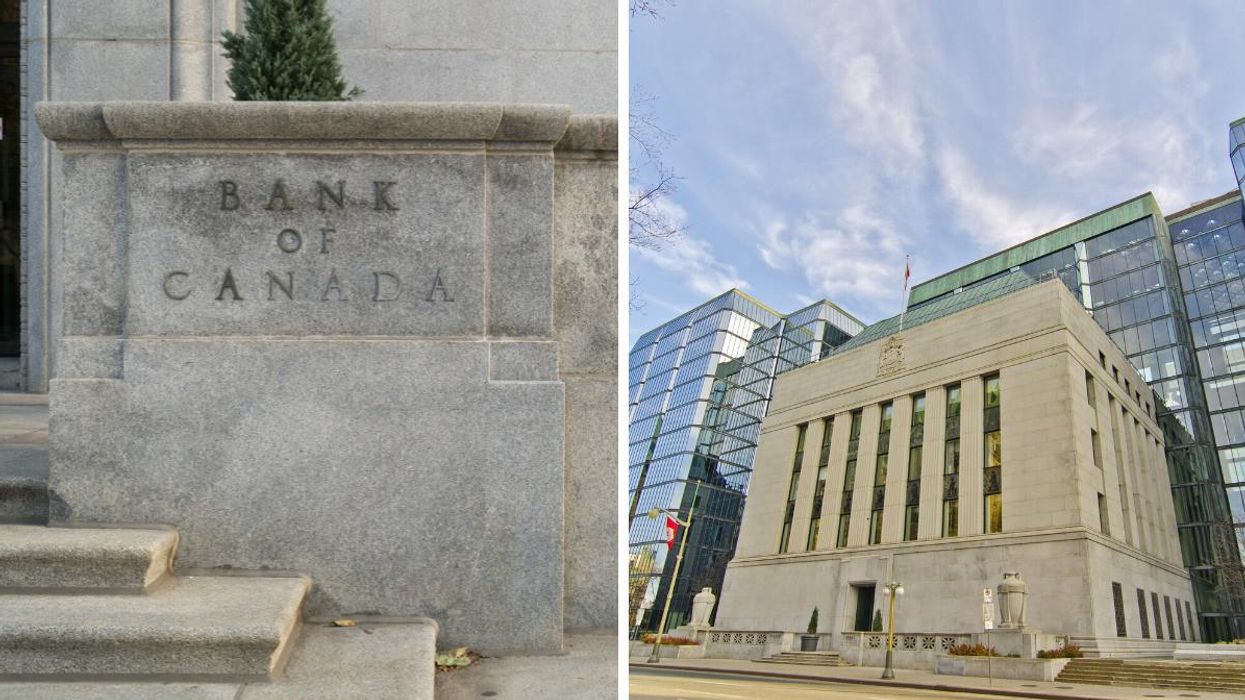The Bank Of Canada's Interest Rate Hike Could Cause A Recession & It's Happened Before
It has lead to a recession three times since 1961!

A Bank Of Canada plaque. Right: The Bank Of Canada headquarters.
New research says Canada might find itself in another recession if the Bank of Canada keeps hiking up the interest rate in response to inflation.
Why? Well, it's happened before.
According to a new analysis by the Canadian Centre for Policy Alternatives (CCPA), every other time in modern Canadian history when the Bank of Canada has tried to combat inflation by upping interest rates, a recession has followed.
And that's what the bank is doing right now, with the goal of bringing inflation down to 2% from the May high of 7.7%.
To try and bring this rate down to a more manageable level, the Bank of Canada has raised the prime interest rate multiple times in the last few months, most recently upping it to 1.5%.
Not only that, but it has suggested they make more hikes within the year.
The instances that they've tried the same strategy to reduce inflation since 1961 were in 1974-76, 1981-83 and 1991-92, and each time it led to a recession.
"If a pilot told me that they'd only ever attempted a particular landing three times in the past 60 years with a 0% success rate, that's not a plane I'd want to be on," wrote David Macdonald, a senior economist with the CCPA.
The article also points out that historically when the inflation rate has fallen, so has the employment rate.
If the Bank of Canada were to meet that 2% inflation target, it could mean a 2.7% hit to the employment rate, says Macdonald. This equates to almost 850,000 Canadians losing their jobs.
In the 1981-83 fight against inflation, Canada's employment rate saw a record decrease of 4.2%, which in 2022 would mean 1.3 million Canadians out of work.
"It's time for a new policy on inflation that isn't just 'jack up interest rates.' That old approach will drive us right back into another recession," said Macdonald.
Economic fears have been recently quite rampant for a lot of Canadians, with some homeowners even worrying about having to sell their homes if the interest rate were to increase any more.
Add with the soaring prices of essentials like food, gas and housing, it's looking like more of an expensive time for Canadians across the nation.
- Canada's Interest Rate Is Set To Go Up Again & Here's How It Could ... ›
- Rising Interest Rates Could Lead To 1 In 4 Canadian Homeowners ... ›
- Canada's Inflation Rate Is The Highest It's Been Since 1983 & Here's ... ›
- Ottawa's Real Estate Market Saw Home Sales Drop By Almost 30% Last Month & Here's Why - Narcity ›
- Hamilton's Real Estate Market Is 'Bubbling' & Here's What That Means For Future Homebuyers - Narcity ›
- Canada's Interest Rate Just Jumped By A Whopping 1% & Here's Why Everyone's Saying 'WTF' - Narcity ›
- Inflation In Canada Is Up Again & How Much Extra We're Paying For Everything Is Painful - Narcity ›
- 3 More Interest Rate Hikes Are Coming This Year According To An Expert & It's Going To Hurt - Narcity ›
- The Bank Of Canada Explained Why It's Raising Interests Rates & How This Combats Inflation - Narcity ›
- The Interest Rate In Canada Just Went Up Again & Here's What It Actually Means For Your Wallet - Narcity ›
- Here's How To 'Recession-Proof' Your Life In Canada, According To A Financial Expert - Narcity ›
- Canada's Interest Rate Has Increased Yet Again & Here's What It Means For Homeowners - Narcity ›